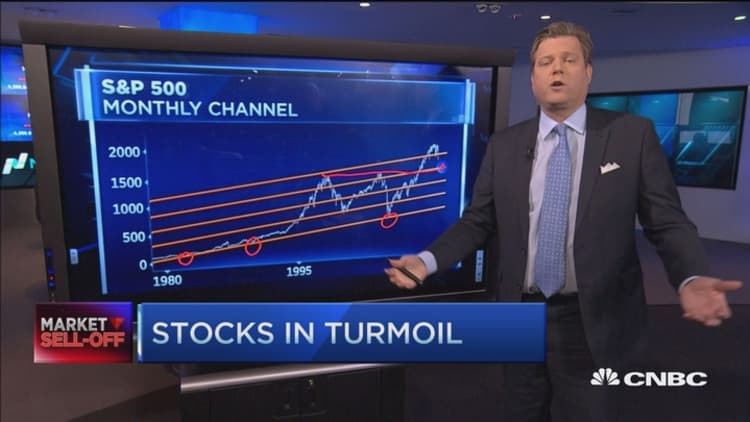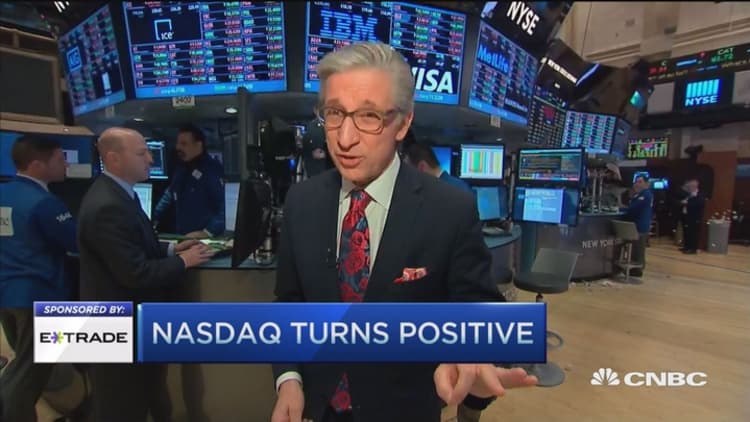


Global financial markets are just plain scared about a lot of things but perhaps the biggest fear of all is that the world's central banks are no longer able to rescue them. Here are five things that are shaking up markets.
1. Central banks out of bullets? The world's central banks rode to the rescue after the 2008 financial crisis, using innovative policies to stop the globe from sliding deeper into recession. The Fed used its balance sheet to add liquidity and unfreeze the credit markets by loading up on mortgages and other securities, and it took the extraordinary step of holding rates at zero for seven years.
Even before the Fed moved forward to normalize rates with its first rate hike in December, the dollar rose in anticipation, hurting commodities prices and emerging economies. Now central banks are trying to encourage inflation and growth, and some, like the Bank of Japan, are using negative rates in hopes of stimulating activity.
Read MoreYellen: Negative rates not off the table
Negative interest rates, however, scare the markets, and trillions of bonds now have negative yields. The markets have also moved against the BOJ, driving the yen higher and Japanese stocks lower. In the U.S., the fed funds futures market is no longer pricing in a rate hike, but instead is beginning the early speculation about a potential rate cut. This is one reason why traders are wondering if there really is anything left the world's central bankers can do.
Read MoreGold surges in market panic
2. If only oil prices would just stop falling. That is the lament from traders in all financial markets. Oil has become the poster child for what ails markets, and equities have moved in lockstep with it. That has made it a key focus of the Treasury market.
As one strategist says, many of the positives from the more than 75 percent decline in oil have gone unnoticed. They are shared by billions of people across the planet, but the pain of oversupply is concentrated among the producers and their workers.
Producing countries are running deficits and slashing budgets, and companies are facing ugly losses, cutting spending, workers and output. But production is not slowing down, and the world remains oversupplied. West Texas intermediate crude was challenging the January low in the futures at just above $26 per barrel. If oil prices can bottom, it would break the grip on stock prices and decouple other markets from a major source of pain.
3. China worries. China's economy is slowing but it's not clear by how much. The fear is that the Asian nation faces a credit bubble in its massive corporate and local government debt. China's foreign exchange reserves fell to a three-year low in January.
The People's Bank of China unexpectedly devalued the yuan last summer, saying it wanted to bring the currency in line with the market. But that spooked investors and they sold the yuan. Chinese leaders have ruled out a big one-time devaluation of the currency but investors see a falling yuan as a risk for financial markets since it could start a round of competitive devaluations — or currency wars.
Read MoreWhat's choking China's economy?
4. Global recession!! While U.S. growth is sluggish, a series of weakening data and the collapse of asset prices across financial markets has triggered fears that the markets could lead the world into recession. Industrial production is weaker in most parts of the world, and the U.S. has been in a manufacturing recession.
There is concern that the services sector could be slowing as well, but the job market remains strong. U.S. growth is estimated above 2 percent for the first quarter, while growth was only 0.7 percent in the first quarter. Markets are clamoring for fiscal stimulus now that central banks are perceived as having run out of new tricks to spur growth. There is the fear that the financial markets could bring on a recession. As one economist put it: This may be the first time ever that we talked ourselves into a recession.
5. New financial crisis? Europe's bankers are quick to talk up the health of their institutions but markets so far aren't buying it. European bank stocks are off 10 percent this week and 30 percent since the beginning of the year. There are two types of concerns around the banks. One is the prospect of a bad loan book, and perhaps not enough capital to back them up. The other concern is profitability and the negative yields make that an even bigger concern for banks globally. Societe Generale was the latest European bank to issue a profit warning, and it ended down nearly 13 percent in European trading.


